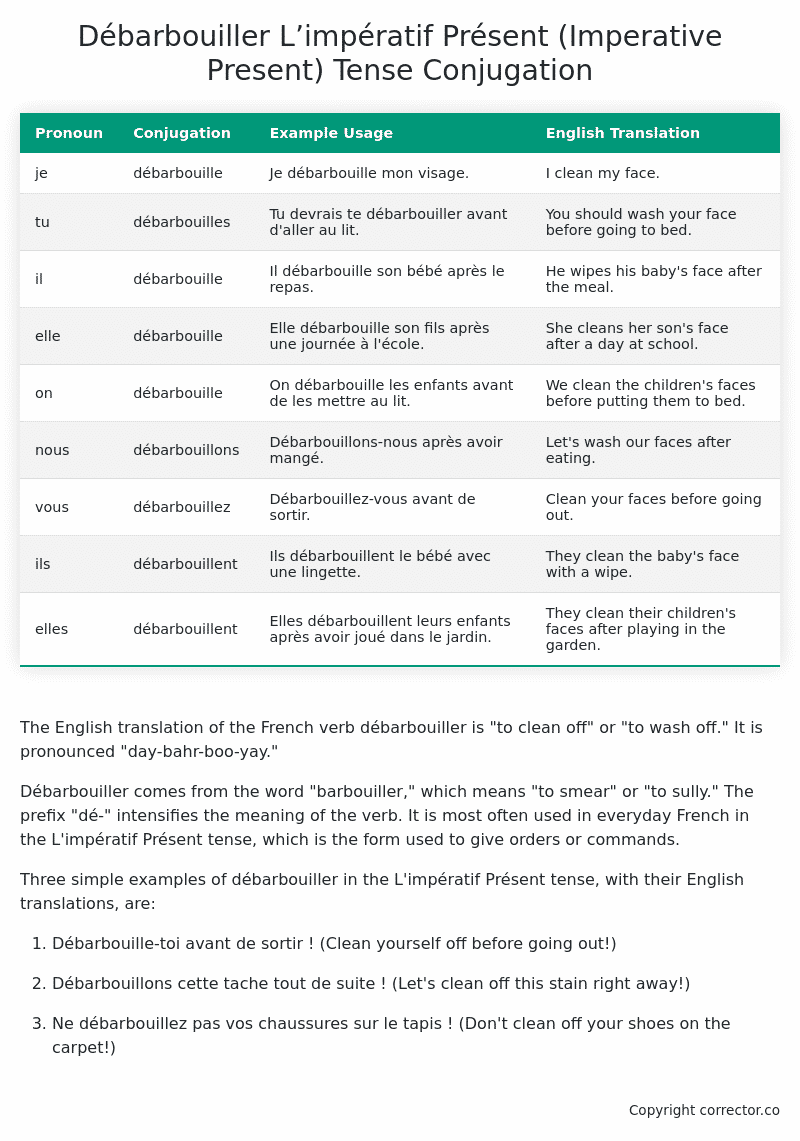L’impératif Présent (Imperative Present) Tense Conjugation of the French Verb débarbouiller
Introduction to the verb débarbouiller
The English translation of the French verb débarbouiller is “to clean off” or “to wash off.” It is pronounced “day-bahr-boo-yay.”
Débarbouiller comes from the word “barbouiller,” which means “to smear” or “to sully.” The prefix “dé-” intensifies the meaning of the verb. It is most often used in everyday French in the L’impératif Présent tense, which is the form used to give orders or commands.
Three simple examples of débarbouiller in the L’impératif Présent tense, with their English translations, are:
-
Débarbouille-toi avant de sortir ! (Clean yourself off before going out!)
-
Débarbouillons cette tache tout de suite ! (Let’s clean off this stain right away!)
-
Ne débarbouillez pas vos chaussures sur le tapis ! (Don’t clean off your shoes on the carpet!)
Table of the L’impératif Présent (Imperative Present) Tense Conjugation of débarbouiller
| Pronoun | Conjugation | Example Usage | English Translation |
|---|---|---|---|
| je | débarbouille | Je débarbouille mon visage. | I clean my face. |
| tu | débarbouilles | Tu devrais te débarbouiller avant d’aller au lit. | You should wash your face before going to bed. |
| il | débarbouille | Il débarbouille son bébé après le repas. | He wipes his baby’s face after the meal. |
| elle | débarbouille | Elle débarbouille son fils après une journée à l’école. | She cleans her son’s face after a day at school. |
| on | débarbouille | On débarbouille les enfants avant de les mettre au lit. | We clean the children’s faces before putting them to bed. |
| nous | débarbouillons | Débarbouillons-nous après avoir mangé. | Let’s wash our faces after eating. |
| vous | débarbouillez | Débarbouillez-vous avant de sortir. | Clean your faces before going out. |
| ils | débarbouillent | Ils débarbouillent le bébé avec une lingette. | They clean the baby’s face with a wipe. |
| elles | débarbouillent | Elles débarbouillent leurs enfants après avoir joué dans le jardin. | They clean their children’s faces after playing in the garden. |
Other Conjugations for Débarbouiller.
Le Present (Present Tense) Conjugation of the French Verb débarbouiller
Imparfait (Imperfect) Tense Conjugation of the French Verb débarbouiller
Passé Simple (Simple Past) Tense Conjugation of the French Verb débarbouiller
Passé Composé (Present Perfect) Tense Conjugation of the French Verb débarbouiller
Futur Simple (Simple Future) Tense Conjugation of the French Verb débarbouiller
Futur Proche (Near Future) Tense Conjugation of the French Verb débarbouiller
Plus-que-parfait (Pluperfect) Tense Conjugation of the French Verb débarbouiller
Passé Antérieur (Past Anterior) Tense Conjugation of the French Verb débarbouiller
Futur Antérieur (Future Anterior) Tense Conjugation of the French Verb débarbouiller
Subjonctif Présent (Subjunctive Present) Tense Conjugation of the French Verb débarbouiller
Subjonctif Passé (Subjunctive Past) Tense Conjugation of the French Verb débarbouiller
Subjonctif Imparfait (Subjunctive Imperfect) Tense Conjugation of the French Verb débarbouiller
Conditionnel Présent (Conditional Present) Tense Conjugation of the French Verb débarbouiller
Conditionnel Passé (Conditional Past) Tense Conjugation of the French Verb débarbouiller
L’impératif Présent (Imperative Present) Tense Conjugation of the French Verb débarbouiller (this article)
L’infinitif Présent (Infinitive Present) Tense Conjugation of the French Verb débarbouiller
Struggling with French verbs or the language in general? Why not use our free French Grammar Checker – no registration required!
Get a FREE Download Study Sheet of this Conjugation 🔥
Simply right click the image below, click “save image” and get your free reference for the débarbouiller L’impératif Présent tense conjugation!

Débarbouiller – About the French L’impératif Présent (Imperative Present) Tense
Usage
Giving commands
Making requests
Offering advice
Expressing desires
Conjugation Formation
Interactions with other tenses
Want More?
I hope you enjoyed this article on the verb débarbouiller. Still in a learning mood? Check out another TOTALLY random French verb conjugation!


